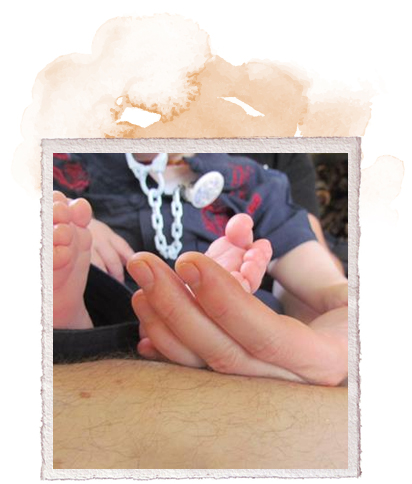

INFORMATION TO BE USED AT YOUR OWN RISK.
Any suggestions or opinions voiced in these pages are those of the authors, and in no way to be constructed as final treatment advice. They are intended as a starting point to develop your own preparation and treatment plan. Please consult your medical and/or psychological experts or caregivers to fine-tune the advice and suggestions for your own unique needs.


ROLE OF THE FATHER IN PREGNANCY, CHILDBIRTH AND PARENTING
Fathers are so important in a healthy family situation. Gone are the days when
dad was side-lined and just the financial provider for the family. Modern fathers
are active and involved from the planning, right through to labour and
child-rearing.
Here are some tips for fathers on how to be a helpful and empowered
companion:
During pregnancy it is the father’s role to provide his partner with unconditional
nurturing and love as she experiences the physical and emotional turbulence of
pregnancy. This might require a lot of flexibility, patience and acceptance on his
behalf. The more centred the father remains, the better able he will be to help
his partner regain her emotional balance. The experience of pregnancy and
childbirth can therefore be enhanced through having a good team mentality
and a solid game plan for various scenarios
- Before engaging in conflict or confrontation, remember that it is the baby
who is at the receiving end of the uncomfortable feelings that are
generated.
- Help reduce your partner’s concerns about her changing body-shape.
Do not add to her worries by noting your concerns about her weight gain,
stretch marks, change of her breasts etc. Try to reassure her that her body will return to its normal shape after the birth and use every opportunity you can to express how you admire her beautiful pregnant body.
- Try to be sensitive and creative when it comes to your sexual relationship. Be aware that a pregnant woman’s sexual appetite may change during the course of pregnancy. Many women experience tiredness and discomfort during the first and last trimesters, although sex is safe and possible for most couples throughout pregnancy. Do not take her lack of sexual interest personally. Remember that even if you do not engage in sexual intercourse, you can still be affectionate and sensual.
- Provide emotional support to your partner – listen to her fears and concerns; acknowledge the reality of what she is experiencing; share her feelings about the matter; giver her regular reassurance of your love for her; avoid doing anything that could contribute to you partner’s anxiety e.g. do not plan a business trip within one month of her due date.
- Identify your own social support, in addition to your partner, that you can rely on when you are feeling stressed or overwhelmed.
- Discuss the birth and the days thereafter with your wife before baby arrives – dealing with visitors; food; household tasks; routines for sleeping and eating; listening to others’ advice etc.
- Expect the unexpected and learn not to be surprised by surprises.
THE FATHER SHOULD NOT MINIMISE THE IMPORTANCE OF HIS PRESENCE AT VARIOUS STAGES DURING PREGNANCY.
SOME OF THESE INCLUDE:
- Identify your own social support, in addition to your partner, that you can rely on when you are feeling stressed or overwhelmed.
- Discuss the birth and the days thereafter with your wife before baby arrives – dealing with visitors; food; household tasks; routines for sleeping and eating; listening to others’ advice etc.
- Expect the unexpected and learn not to be surprised by surprises.
- Visits to the healthcare provider, whether it be for regular check-ups or when there is a concern.
- Any scans/ultrasounds.
- All birth-education classes.
- Preliminary visits to the hospital or birthing centre.
- Any test procedures and discussion of the results.
- The birth of the baby.
One of the major roles of the father as birthing companion is to help create a safe and supportive environment for the birthing mother and the new baby. The birth companion might not be able to take away the mother’s pain or discomfort, but can ease her discomfort through supporting her. Through words and actions the father can show that he believes in the mother:
- Provide physical comfort such as giving her water, warm packs, touching her, breathing with her and telling her you love her; handling visitors; talking to nurses and doctors.
- Light touch massage (featherlike touch that may cause goosebumps to arise) during the last month of pregnancy, as well as during labour itself promotes relaxation and a deeper connection between partners.
- Apply lower-back counter pressure to relieve lower-back discomfort. Use the heel of your hand, a fist or a tennis ball. The pressure normally feels best when applied between the lower back and the tailbone. Apply the pressure and then rotate it in a slow, circular motion.
- Stroke the spine with the palm, starting in the neck on the right side of the spine, slowly sliding the hand down the back to the tailbone. Repeat on the left, and then repeat the process for approximately 5 minutes.
BEING A FATHER IN A CHILD'S LIFE
"To become a father is not hard; to be a father is, however." - Wilhelm Busch
Parenthood is the long term commitment to “growing” a small baby into a healthy, happy and independent adult. Successful parenting is therefore more of a journey of growth and discovery than a skill, and requires the commitment, passion and humility of (preferably) both parents. The level of influence a parent has on a child’s life and actions is directly proportional to their level of involvement in the child’s life as well as the quality of the relationship shared between parent and child. Today, the father’s role in a child’s cognitive, emotional and physical development is acknowledged and accepted, whereas before his role was mostly relegated to the financial support of the family.
FACTS OF A FATHER
- Fathers can be just as capable as mothers of learning parenting skills as quickly as mothers do, and of taking care of their baby’s needs. They must be given the opportunity. Remember, parenting is a learned experience.
- Fathers who are highly involved in their infant’s life can experience a mutually fulfilling emotional bond with their baby, similar to ‘falling in love’.
- Babies benefit from the physically active manner in which fathers can play with them. ‘Rough and tumble’ play stimulates the infant and can promote cognitive development and the motivation to succeed. Fathers are likely to encourage their babies’ curiosity, pushing them to solve physical and mental challenges.
- The child’s experience of safety and stability in the parental home (e.g. family income; the relationship between parents and with the child) lays the foundation for the development of trust in the world.
- The child’s social development, self-esteem and sexual identity can be enhanced through father involvement.
- “Fatherlessness” has been related to later childhood delinquency, drug and alcohol use – lack of respect for authority; refusal to take responsibility for actions; inability to control impulse.
- Sons who have warm and nurturing fathers are able to integrate their father’s problem-solving abilities and have greater self-control. They also tend to be less promiscuous in their adulthood.
- Daughters who have close relationships with their fathers tend to have an increased sense of femininity and competency. They are less likely to seek out male attention, touch and approval in their relationships with boys.
- Children raised by a responsible father do better financially later in life.
HOW TO MAKE FATHERHOOD WORK
- Build a relationship with your child from the start. Fathers who bond with their child from pregnancy and birth onwards find it easier to stay connected with the child, develop a routine and find their feet – feeding; bathing; playtime; bedtime reading etc.
- Don’t let work be an excuse. Make family a top priority in your life. Schedule birthday parties, school functions and events in your diary first.
- Become and expert. Fathers are just as capable as mothers to explore ways to become a better parent – don’t leave all the decision-making up to your spouse.
- Look after your marriage. Children are sensitive and can pick up vibes between parents. Make sure that you make enough time for each other. You were a couple first before you became parents.
- Be affectionate. Make hugs and positive verbal feedback a daily practice.
- Have regular one-on-one time with each child. Each child needs to know that they are special and that you value them as individuals. One-on-one play helps you to stay connected to each child’s unique personality.
- Show your kids where you work. Your children will also be encouraged to stay connected to you and this other side of you.
- Connect on every level. Through showing interest in various topics pertaining to your child’s life (friends, hobbies, games, teachers and activities) you are better able to tune into your child’s life and respond on a deeper level.
- Keep in touch when you are away. Young children can easily feel abandoned. Through regular phone calls and a little gift you can make business trips easier on your children.
- Build a life together. Hobbies, adventures and playtime with dad are the stuff that childhood memories are made of .
- Be in control of your future. Be in touch with the reality of your situation, whatever that might be - income; spousal relationship management; successful communication; decisiveness; career satisfaction. Make plans to address your ‘weaknesses.’

